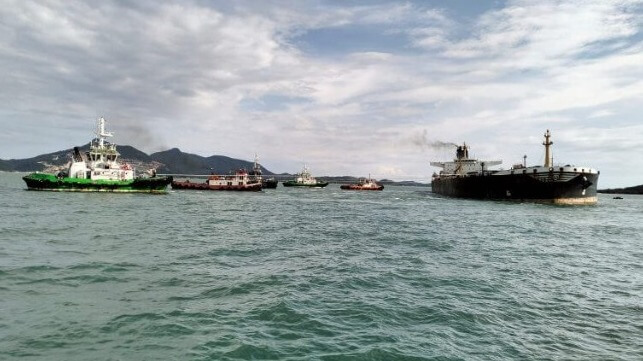Marshall Islands Shuts Down Insurer With "Dark Fleet" Ties

The corporate registry of the Marshall Islands has taken the rare step of shutting down a maritime insurer, Continental Steamship Owners Mutual Protecting & Indemnity Association, according to Bloomberg.
Continental was a non-International Group P&I club with a web presence that began in 2020. It had no listed office address, but was registered to the Trust Company Complex in Majuro, Marshall Islands, the mail-forwarding address used by the Marshall Islands' Virginia-based offshore registry administrator. Though the firm's true address may be hard to find, Continental's two phone contact numbers suggest a link to Estonia.
Continental has now been "forcibly dissolved," the Marshall Islands' registry administrator told Bloomberg, for violating a ban on insurance activities.
Continental was the insurer of about two dozen "dark fleet" tankers, according to Lloyd's List, including the tanker Liberty - an aging Suezmax that went aground in the Strait of Malacca on December 2 with a million barrels of Venezuelan oil aboard. Liberty remained aground for a week before her cargo was lightered off, and she was finally refloated Thursday.
Liberty was an example of a risk that shipowners and regulators have warned about for some time: aging "dark fleet" tankers appear to pose an outsize risk of marine casualties, and their lesser-known insurers may or may not be able to cover the nine-figure damages associated with a major accident. As the reputable International Union of Marine Insurers (IUMI) puts it, many of these ships have a "severe lack of insurance," posing financial risk to other ships and to coastal states in the event of a casualty.
The "dark fleet" phenomenon dates back to the imposition of U.S. restrictions on Iranian and Venezuelan oil, but has accelerated rapidly as Russia seeks out new capacity to carry its crude exports. The Western "price cap" sanctions regime on Russian crude exports has prompted tanker operators to exit the trade and sell older tonnage to anonymous upstarts, some Russian-controlled.

that matters most
Get the latest maritime news delivered to your inbox daily.
IUMI notes that operating practices in this fleet do not consistently align with industry standards. Many of these vessels show signs of improper maintenance, have missed their inspections, or operate with their AIS transponders turned off, raising the risk of a spill or collision.
Liberty is the latest example of the possible outcomes, but not the first. In May, the Iran-affiliated tanker Pablo blew her main deck off while at anchor off Malaysia, killing three crewmembers. The ship was 26 years old and had changed her name seven times in five years.
